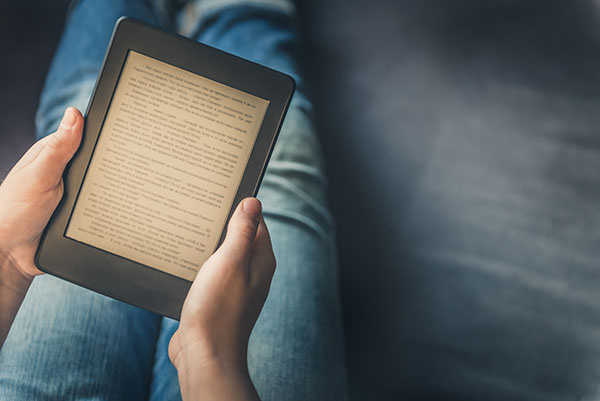On my doorstep, the other day landed (with an actual thud) an ARC (Advanced Readers Copy) of my new book, Loyalty. When I receive such volumes, it is always very special because the manuscript that I have been working on for so long—spinning a cocoon, so to speak—has turned out a butterfly—a book.
It looks different, it feels different, and most fascinating to me, it reads differently. I’m not altogether sure why this is so. Perhaps it is no more than the deeply embedded psychology I have developed from a lifetime of reading actual books. These days—and for years now—I compose on a computer, but a computer screen is not a book. I find it hard to read a full-length book straight through on a computer. At a certain point, I must always print pages and work with words on paper.

As for reading on an e‑reader, I always feel like I am walking on a slimy surface. My eyes seem to slide around the back-lit page.
(I think it is against the laws of God and man for a page to shine up at me. My reading light should shine down onto the page.)
With an e‑book I find myself glossing over words, paragraphs, whole pages. God help me if I tap the ruddy thing the wrong way. I’m never quite sure where I am. Maybe because it inevitably puts me to sleep.
Is this just me? My age? My habits of reading? Do millennials have this problem? Am I a Luddite? [OED: “One who opposes the introduction of new technology, esp. into a place of work.”]
Because when I read a real book I always know where I am. Moreover—explain this to me—the work achieves a wholeness, an inherent logic (or lack of) that gives a better sense of the qualities of the writing, or, for that matter, its weaknesses.
Surely some education doctoral candidate has studied how readers react differently (if they do) to printed text and pixel text. Do we absorb more? Remember more? Learn more in one format or the other? If so, someone please tell me. To echo Patrick Henry, I know not what course others may take, but as for me, give me print over pixels any day.
So, having received the ARC of Loyalty, I was able to spend a whole day reading through my 335-page work—curiously enough—the first time I was able to do so. I started at about nine AM and finished it around nine PM. While it may seem odd to say so, I was able to enjoy the text and was much relieved that it held together with the kind of suspense I enjoy writing. “Better than I had thought it was,” I told my wife when I put it down. “It works just fine.” I felt great relief.
I had written a book.
5 thoughts on “A Computer Screen is Not a Book”
I love your posts. Have read them for years. This is truth in my world.
Thank you, Avi
Gillian Foster
Yes. Hard to read really good work on a device. I have in a pinch read on my actual phone via Kindle reader. Not ideal, but I will do that if I must. i don’t like the Kindle I bought at all. Too dim a screen. I love a good book.…everything about a book, good or not matters to me. I want to snuggle up to it and let it wrap its arms around me. So this does speak to me. Janet F
I can think of few technologies more perfect than the bound book. Those digital abominations do not and cannot ever “enhance” or “improve” upon the experience of reading words on paper.
There appears to be quite a body of scientific literature on the topic. The most famous paper, Mangen 2013 (“Reading linear texts on paper versus computer screen: Effects on reading comprehension”; https://doi.org/10.1016/j.ijer.2012.12.002), agrees with your observations.
I used to chuck my strong preference for paper books to age and conditioning. But my kids (generation Z) much prefer paper books.
Screens are useful to skim the news. Good fiction is best served with the light shining on it, not from behind it.